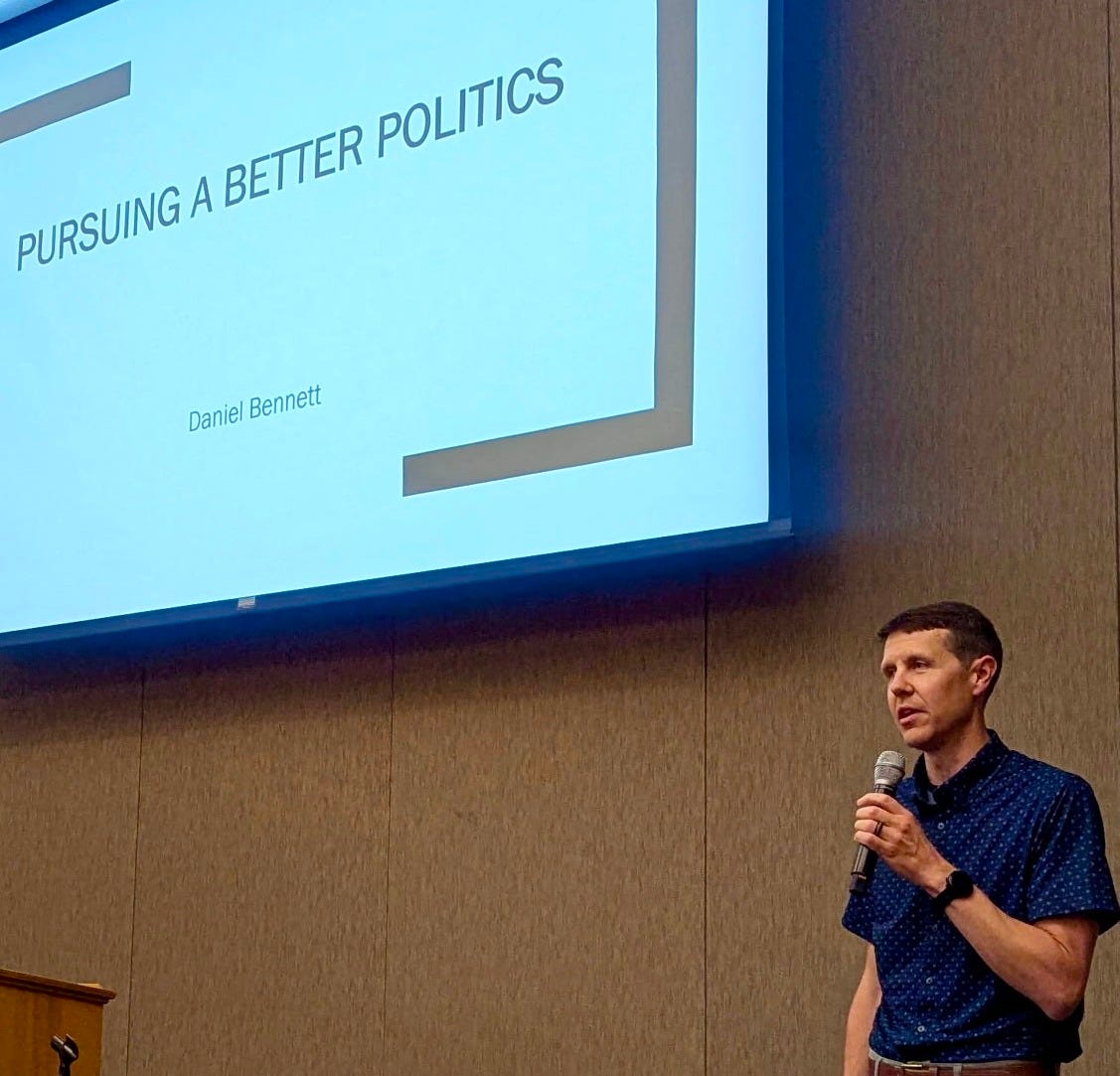
Greetings from the other side of yet another academic year.
The Fall 2024 and Spring 2025 semesters were probably most challenging of my career. Much of this was owed to an unusually large teaching load, as well as assuming the role of Director for the Center for Faith and Flourishing. Add to that an increasingly frenetic schedule with kids’ activities—including cross country, basketball, baseball, track and field, band, choir, and piano lessons—and our weekly church commitments, and these past nine months or so were some the busiest of my life.
They were, for a variety of reasons, also the most rewarding. I’ll stick to the professional side of things:
I was promoted in rank to “Professor,” which included an opportunity to speak to my colleagues about the pursuit of a healthier, better politics in an era of increasing division, hostility, and anger.
The Center for Faith and Flourishing received a number of large gifts that will endow its work for the future, providing funding for speakers, events, and student programming in perpetuity. I’m thrilled to be able to serve as Director for the foreseeable future.
I was accepted to take part in a faculty research workshop in Belfast, Northern Ireland, where I will continue to develop a new project on whether and how evangelical pastors shape the political identities of their congregants.
Oh, and one year ago today, Uneasy Citizenship was officially released.
I’m thankful for folks who have read and commented on the book. I’m thankful for the thoughtful reviews in Providence and Christian Scholars Review. I’m thankful to have given talks on the book at George Fox University, Park Cities Presbyterian Church, and the American Values Coalition’s “Politics, Polarization, and Peacemaking” workshop, among others. And I’m thankful for the opportunity to discuss the book in written and audio venues, including…
But most of all, I’m thankful for you. Thank you for your engagement with this work. It means a lot.
And if you haven’t ordered the book, you can find it here. Or here. Or here. Or anywhere books are sold, I imagine.
Recommended Readings
Is an American pope still a US citizen? (Jack Jenkins, Religion News Service)
When it was announced that Pope Leo XIV would be the first pope born in the United States, Catholics across the country were surprised, and many were elated. For years, Vatican watchers had dismissed the idea that Cardinals would elect a pope from the U.S., assuming the prelates would avoid entangling the Bishop of Rome with the politics of a superpower.
But a political question quickly emerged: Can a sitting pope vote in U.S. elections, and is he still a U.S. citizen?
Taxes, voting, and citizenship: An American pope explainer (Michelle La Rosa, The Pillar)
As long as Leo maintains his U.S. citizenship, the pope should be eligible to vote in future U.S. elections.
In fact, a spokesperson from the Illinois Board of Elections said that as long as Pope Leo maintains an Illinois address, he would be allowed to continue voting.
The pope has maintained an Illinois address the last couple of years, despite living and working at the Vatican.
But even if the pope eventually gives up his Illinois residence, laws governing overseas citizens would still allow him to vote on an absentee ballot.
What Were the Real Origins of the Christian Right? (Daniel Williams, Mere Orthodoxy)
Transactional arrangements alone could not explain the enthusiasm that many evangelicals felt toward Trump. What can explain it, I think, is that the center of evangelical conservatism had shifted from the Sunbelt to the rural South – just as a half-century earlier, it had shifted away from the Midwest. Rural southern evangelicals picked up on the culture-war language of their Sunbelt counterparts who had launched the Christian Right in the 1970s, and they retained the dream of an evangelical take-over of governmental institutions, but this time, they melded it not with the politics of upward mobility, free enterprise, and Reagan-style optimism, but with the politics of grievance and defensiveness. They believed that their own way of life was under attack – and this time, they were determined to defend themselves not restoring the values of the Eisenhower era but by engaging in a much more sweeping attack on the establishment.
The Empty Ecstasy of Digital Crowds (Brad Edwards, The Dispatch)
Thanks to social media, we can do more than join digital crowds; we can build our own: So long as we frame our plight with the right emotional appeal, there will always be someone somewhere willing to link digital arms to further our interests. And whether our cause is universal or niche, algorithms incentivize outrage and affirmation to maximize engagement. These perverse incentives ensure every cause is framed as negatively as possible.
